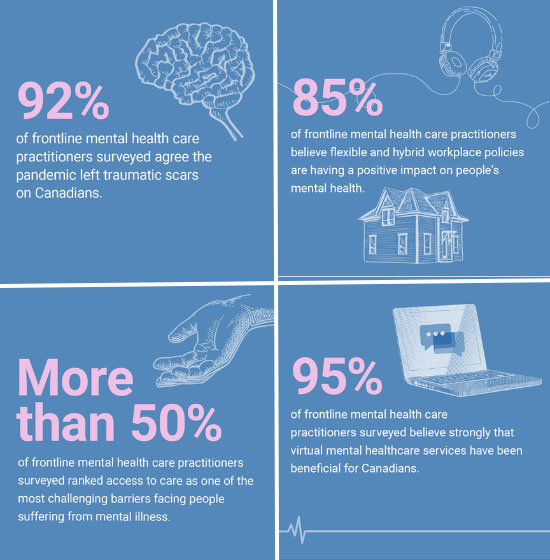TORONTO, ON, January 24, 2023 – The people on the front-line of mental health care across Canada believe the pandemic has created an opportunity to look at care differently, however the financial realities of an economic downturn, and access to care, are significant barriers to positive change.

This coming from a mid-January survey conducted by faculty in Yorkville University’s Master of Arts in Counselling Psychology (MACP) program. Last week, Yorkville University polled 2,200 members of their MACP community, and 7 Key Findings highlight challenges and opportunities emerging from the pandemic.
- 92% of the respondents agree that the pandemic left traumatic scars for individuals across Canada, more than half say the state of parents’ and caregivers’ mental health post-pandemic is somewhat or significantly deteriorating, citing economic stresses, eroding resiliency, and fatigue as contributing factors.
- 78% say economic and financial hardships are the most pressing issues facing individuals suffering from mental illness. In addition, more than half of respondents ranked financial stress as a contributing factor impacting mental health in post-pandemic hybrid workplaces.
- More than half of respondents ranked access to care as one of the most challenging barriers facing people suffering from mental illness.
- 95% believe strongly that the virtual mental healthcare services that accelerated expansion during the pandemic have been beneficial for Canadians.
- 85% believe that flexible and hybrid workplace policies are having a positive impact on people’s mental health.
- 61% of respondents also revealed trauma-informed practice as the top area of importance where more attention, training, and resources are required for psychotherapists dedicated to improving the mental health of Canadians.
- 75% believe trauma-informed and neuroscience and brain-based practices are the most important areas for mental health research, with the greatest potential to improve the lives of Canadians.
While the stigma of mental illness is reducing – and there’s always more we can do – the time is right for positive change.
“The last few years illuminated the importance of mental health as well as the fact that we are all connected, and all affected,” said Dr. Sarah Stewart-Spencer, Dean of Behavioral Sciences at Yorkville University, which provides Canada’s leading online counsellor education graduate program. “There is no debating from this survey that Canadians are exhausted and struggling with the scars of the pandemic coupled with the economic realities they are now facing. However, with the stigma of mental health reducing, and the empathy and understanding of Canadians increasing, the time is right for the frontline to be heard and have access to the tools they need.”
“As leaders in the development of the next generation of mental health practitioners across Canada, we believe positive change can come from listening to those on the front line of care,” said, Julia Christensen Hughes, President of Yorkville University. “The response to this timely survey reaffirms that this is a community of empathetic change-makers who care deeply about having their voices heard as we all work together to support those suffering from mental illness.”
Methodology
From January 11 – 18, 2023, Yorkville University asked its community of front-line psychotherapists, graduate students, and practicum partner sites for their insights on the current state of mental health care in Canada. Eleven questions were asked of the 2200 respondents from the Yorkville University national community.
- 58% were current students in Yorkville University’s MACP (Master of Arts in Counselling Psychology) and DCP (Doctor of Counselling and Psychotherapy)
- 21% were MACP/DCP alumni (practicing/post-graduate psychotherapists/counsellors)
- 17% were Practicum sites/supervisors (community-based organizations/partners)
- 48% from ON/QC, 22% from AB/SK/MB, 20% from BC, 9% from Atlantic and 0.6% from North
Learn more
Dr. Sarah Stewart-Spencer is available to media to discuss these survey results, in addition to other topics, including mental health emerging from the pandemic, workplace mental health, trauma (PTSD), the impact of chronic stress, the need for more counsellors, and the benefits of telehealth and virtual healthcare support services.
About Yorkville University
At Yorkville University, you don’t have to put your life on pause to make progress. Yorkville University is the largest private university in Canada, offering in-person programs at campuses in Toronto and Vancouver, in addition to a fully online campus in Fredericton. Yorkville University’s online programs are accessed by Canadians in every corner of the country. Internationally, Yorkville University students are represented in over 50 countries. Yorkville University offers a diverse range of professional, career-oriented programs, including certificate programs, undergraduate degrees, masters, and a Doctor of Counselling and Psychotherapy degree.
For more information, please contact:
Alyson Musial
Director, Communications
amusial@yorkvilleu.ca
647-537-1627






